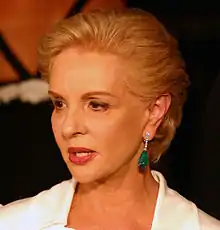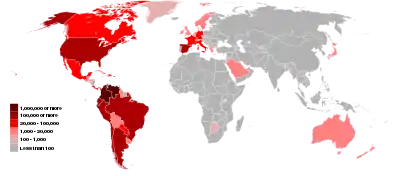Venezuelan Americans
Venezuelan Americans (Spanish: venezolano-americanos or estadounidenses de origen venezolano) are Americans who trace their heritage, or part of their heritage, to the nation of Venezuela. The word may refer to someone born in the US of Venezuelan descent or to someone who has emigrated to the US from Venezuela.
| Total population | |
|---|---|
| 484,445 (2018)[1] 0.15% of the U.S. population (2018)[1] | |
| Regions with significant populations | |
| Languages | |
| Religion | |
| |
| Related ethnic groups | |
| Part of a series on |
| Hispanic and Latino Americans |
|---|
|
Venezuelan Americans are one of 20 Latin American groups in the United States. Venezuela's diverse culture includes influences from Spanish, Portuguese, Italians, Germans, and the French, along with influences from African and Amerindian elements.
Venezuelan Spanish is the group's spoken form of the Spanish language.
In the United States, Venezuelans are on top of the list of nationalities requesting asylum. [2]
History
Until the 20th century, the number of Venezuelans that emigrated to the USA is unknown because they were included in the "Other" category. During the eighteenth and nineteenth century, there were many European migrants who went originally to Venezuela, but later moved to the United States with their children and grandchildren who were born and/or grew up in Venezuela speaking Spanish. From 1910 to 1930, it is estimated that over 4,000 South Americans each year migrated to the United States. However, there are not many specific figures that indicate the number of Venezuelans among the 4,000.[3]
Many Venezuelans settled in the United States with hopes of receiving a better education, only to remain there following graduation. Many Venezuelans who have relatives living in the United States also emigrated to this country. However, since the 1980s, the reasons for Venezuelan emigration have changed to include hopes of earning a better salary.[3] Beginning in the 2000s and continuing up to the present, many Venezuelans opposing the regime of Presidents Hugo Chavez and Nicolás Maduro have migrated to the US (mostly to Florida, but New York City and Houston are other destinations).
Demographics
_(cropped).jpg.webp)
The largest concentration of Venezuelans in the United States is in South Florida, especially the suburbs of Doral and Weston. Other main states with Venezuelan American populations are, according to the 2010 census, Texas, New York, California, New Jersey, Georgia and Virginia. Urban areas with a large Venezuelan community include Miami, Houston, New York City, Los Angeles, and Washington, D.C.[3]

States with highest Venezuelan population
The 10 states with the largest Venezuelan population were (Source: Census 2010[4]):
- Florida – 102,116 (0.5% of state population)
- Texas – 20,162 (0.1% of state population)
- New York – 13,910 (0.1% of state population)
- California – 11,100 (less than 0.1% of state population)
- New Jersey – 6,950 (0.1% of state population)
- Georgia – 6,289 (0.1% of state population)
- Virginia – 4,429 (0.1% of state population)
- North Carolina – 4,070 (less than 0.1% of state population)
- Massachusetts – 3,982 (0.1% of state population)
- Maryland – 3,328 (0.1% of state population)
The U.S. state with the smallest Venezuelan population (as of 2010) was South Dakota with 25 Venezuelans (less than 0.1% of state population).
Population distribution by Venezuelan ancestry
Among U.S. communities in 2000 wherein one thousand or more people indicated their ancestry, those where at least 1% of people claimed Venezuelan ancestry were:[5]
- Doral, Florida 8.22%
- Weston, Florida 4.1%
- Fontainebleau, Florida 3.14%
- The Hammocks, Florida 3.14%
- Key Biscayne, Florida 2.36%
- North Bay Village, Florida 2.15%
- Sunny Isles Beach, Florida 1.96%
- Miami Beach, Florida 1.79%
- Virginia Gardens, Florida 1.58%
- Kendale Lakes, Florida 1.54%
- Kendall, Florida 1.47%
- Surfside, Florida 1.41%
- Richmond West, Florida 1.36%
- West Sand Lake, New York 1.34%
- Aventura, Florida 1.31%
- Country Club, Florida 1.26%
- Bal Harbour, Florida 1.21%
- Coral Gables, Florida 1.17%
- Bay Harbor Islands, Florida 1.15%
- Miami Lakes, Florida 1.06%
- Tamiami, Florida 1.06%
- Miami Springs, Florida 1.01%
- Sand Lake, New York 1.01%

By Venezuelan birth
The top 25 U.S. communities with the most residents born in Venezuela are:[6]
.jpg.webp)
- Doral, Florida 11.1%
- North Westside, FL, 5.0%[7]
- Fontainebleau, Florida 4.2%
- Weston, Florida 4.0%
- The Hammocks, Florida 3.3%
- Chambers Estates, Florida 2.8%
- Kendall West, Florida 2.8%
- The Crossings, Florida 2.7%
- Three Lakes, Florida 2.7%
- Key Biscayne, Florida 2.6%
- Sunny Isles Beach, Florida 2.4%
- Kendale Lakes-Lindgren Acres, FL, 2.2%[8]
- Virginia Gardens, Florida 2.1%
- Richmond West, Florida 2.0%
- Golden Beach, Florida 2.0%
- Broadview-Pompano Park, Florida 2.0%
- Ramblewood East, Florida 2.0%
- Kendale Lakes, Florida 1.9%
- Kendall, Florida 1.9%
- St. Regis Park, Kentucky 1.9%
- Coldstream, Kentucky 1.9%
- Country Walk, Florida 1.8%
- Celebration, Florida 1.8%
- Meadow Woods, Florida 1.8%
- Country Club, Florida 1.7%
Ethnic variety
The Venezuelan American population represents Venezuela's ethnic variety. Some 70 percent of Venezuelan immigrants are a mixture of European, Amerindian, and African ancestry. The rest are 21 percent white, 8 percent black and 1 percent is Amerindian. Most Venezuelan Americans are descendants of Spanish (mainly), Africans, Italians, Portuguese, Germans, French, and Chinese.[3][9]
Socioeconomics

The Venezuelan American population are highly educated. The people obtain a bachelor's, graduate, and professional degrees at nearly double (48.5%) the total U.S. national percentage (27%), while only 6% of the group's adults did not complete high school, compared to 15.9% of the total U.S. national population.[10] Venezuelan Americans are not only highly adapted to the English language and achieve great accomplishments in American education, but also tend to consider the teaching and preservation of the Spanish language a priority for the most part. Thus, they teach the language to their children. And emphasize an extreme importance to obtaining a level of academic achievement and/or technical acumen to their own children.
Venezuelan Americans work in a variety of professions. However, most of them are inclined to banking and the petroleum industry. Thus, they often have a significantly deep depth of expertise within these specific professions. Venezuelan Americans also work in highlighted positions of television, publishing, and radio industries. In addition, many Venezuelan Americans are becoming politicians or entering some form of public service within government, working both local politics and federal politics. Furthermore, there is a significant growth in the number of Venezuelan Americans that engage in the public arena of politics specific at the Federal level, going so far as proactively submitting for electoral consideration for those federal public positions. In general, most common Venezuelan Americans citizens will often engage heavily and overtly in US politics, and the politics of their native country, and are often extremely well informed and a few among their number are astute near-consistent life-long polymath students of history, language, science, culture, and economics.
They will often be very aware of specific political policies, local, state, and federal laws, and the history of where those policies and laws come from. The attitude among these few Venezuelan Americans is that there is no shame of not knowing something, but to be content and complicit in not knowing is something to be truly ashamed of. So they will often instead view the lack or absence of knowing something as an opportunity to proactively engage a deep self study on a particular subject to be better suited and far capable to speak to that subject the next time they engage in a discussion on that same subject.[3]
Relations with Venezuela
Venezuelan Americans still maintain strong relations with their country of origin, which can easily be seen in business, family, and community life. Venezuelan Americans often report on the social and current events in Venezuela and first-generation immigrants visit there frequently. It is also quite common for Venezuelans to visit their relatives in the United States.[3]
Notable people
See also
References
- "B03001 HISPANIC OR LATINO ORIGIN BY SPECIFIC ORIGIN - United States - 2018 American Community Survey 1-Year Estimates". U.S. Census Bureau. July 1, 2018. Retrieved November 25, 2019.
- The Venezuelan Walkers
- Drew Walker (2010). "A Countries and Their Cultures: Venezuelan American". Everyculture.com. Retrieved 17 January 2018.
- "American FactFinder – QT-P10: Hispanic or Latino by Type: 2010". Factfinder2.census.gov. Archived from the original on 25 January 2015. Retrieved 17 January 2018.
- "Venezuelan ancestry by city – ePodunk". Epodunk.com. Retrieved 2008-12-01.
- "Top 101 cities with the most residents born in Venezuela (population 500+)". City-data.com. Retrieved 2008-08-01.
- "North Westside, Florida (FL 33178) profile: population, maps, real estate, averages, homes, statistics, relocation, travel, jobs, hospitals, schools, crime, moving, houses, news, sex offenders". City-data.com. Retrieved 18 January 2018.
- "Kendale Lakes-Lindgren Acres, Florida (FL 33183) profile: population, maps, real estate, averages, homes, statistics, relocation, travel, jobs, hospitals, schools, crime, moving, houses, news, sex offenders". City-data.com. Retrieved 18 January 2018.
- (PDF). 20 September 2008 https://web.archive.org/web/20080920172933/http://convergencia.uaemex.mx/rev38/38pdf/LIZCANO.pdf. Archived from the original (PDF) on 20 September 2008. Missing or empty
|title=(help) - "S0201. Selected Population Profile in the United States; Population Group: Venezuelan". 2006 American Community Survey. United States Census Bureau. Archived from the original on 2020-02-12. Retrieved 2008-06-02.
